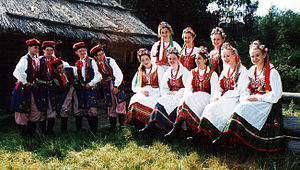- Krakowiak
-
 Folk dancers in traditional costumes from Kraków (regarded as Polish national costumes)
Folk dancers in traditional costumes from Kraków (regarded as Polish national costumes)
The Krakowiak, sometimes referred to as the Pecker Dance, is a fast, syncopated Polish dance in duple time from the region of Krakow and Little Poland. This dance is known to imitate horses, the steps mimic their movement, for horses were well loved in the Krakow region of Poland for their civilian as well as military use. It became a popular ballroom dance in Vienna ("Krakauer") and Paris ("Cracovienne")— where, with the polonaise and the mazurka, it signalled a Romantic sensibility of sympathy towards a picturesque, distant and oppressed nation— and in Russia, a krakoviak is featured in Mikhail Glinka's A Life for the Tsar (1836).
The first printed Krakowiak appeared in Franciszek Mirecki's album for the piano, "Krakowiaks Offered to the Women of Poland" (Warsaw, 1816). Frederic Chopin produced a bravura concert krakowiak in his Grand Rondeau de Concert Rondo á la Krakowiak in F major for piano and orchestra (op. 14, 1828).
In terms of its choreography, the krakowiak is set for several couples, among whom the leading male dancer sings and indicates the steps. According to the description in the New Grove Dictionary of Music and Musicians, the krakowiak is directed by the leading man from the first pair. As they approach the band, "the man, tapping his heels or dancing a few steps, sings a melody from an established repertory with newly improvised words addressed to his partner. The band follows the melody, and the couples move off in file and form a circle (with the leading couple back at the band). Thereafter verses are sung and played in alternation, the couples circulating during the played verses.
See also
Other national dances of Poland: kujawiak, mazur and oberek.
- Redowa
- Varsovienne
References
Dance Types Solo · Partner · Group
Ceremonial · Competitive · Concert · Participation · SocialGenres Acro · Bachata · Ballet · Ballroom · Baroque · Belly · Bhangra · Bharatanatyam · Breaking · Chicago Style Stepping · Country-western · Cumbia · Disco · Erotic · Folk · Forró · Hip-hop · Jazz · Kabuki · Kathak · Kathakali · Krumping · Kuchipudi · Lap · Line · Manipuri · Merengue · Modern · Mohiniyattam · Odissi · Persian · Salsa · Sattriya · Scottish Highland · Sequence · Street · Swing · Tango · Tap · Waltz · War
Technique Choreography · Connection · Dance theory · Lead and follow · Moves (glossary) · Musicality · Spotting · Turnout
See also Categories:- Polish dances
- Culture of Kraków
- Dance forms in classical music
Wikimedia Foundation. 2010.
